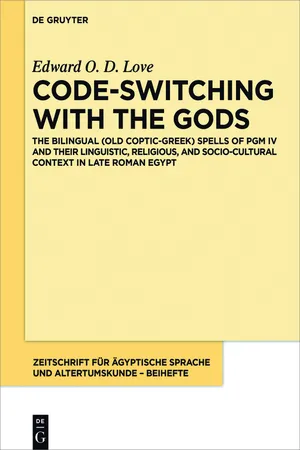
Code-switching with the Gods
The Bilingual (Old Coptic-Greek) Spells of PGM IV (P. Bibliothèque Nationale Supplément Grec. 574) and their Linguistic, Religious, and Socio-Cultural Context in Late Roman Egypt
- 400 pages
- English
- ePUB (mobile friendly)
- Available on iOS & Android
Code-switching with the Gods
The Bilingual (Old Coptic-Greek) Spells of PGM IV (P. Bibliothèque Nationale Supplément Grec. 574) and their Linguistic, Religious, and Socio-Cultural Context in Late Roman Egypt
About this book
This volume provides the first comprehensive text edition of the Egyptian language sections of P. Bibliothèque Nationale Supplément Grec. 574 (PGM IV) and analysis of their script, language, and the bilingual spells which they are part of. The magical practices preserved in the PDM and PGM have been published for nearly a century, yet it is only recently that research has focused on investigating the complex relationship between the languages, scripts, and religious traditions they exhibit, as well as the question of who composed, copied, and practiced these spells. Focusing on the bilingual divinations, lust spell, and exorcism of PGM IV, written in the Egyptian and Greek languages - and rendered in Old Coptic scripts and the Greek script respectively - this volume analyses their textual content and ritual mechanics, contextualised among the PDM and PGM, and investigates the potential identities of the magical practitioners of late Roman and Late Antique Egypt. Encompassing the disciplines of Egyptology, Coptology, Papyrology, and Late Antique studies, this volume focuses in particular on the themes of magical practice, bilingualism, script, and the social context of magic in Egypt during the 2nd to 4th centuries CE.
Frequently asked questions
- Essential is ideal for learners and professionals who enjoy exploring a wide range of subjects. Access the Essential Library with 800,000+ trusted titles and best-sellers across business, personal growth, and the humanities. Includes unlimited reading time and Standard Read Aloud voice.
- Complete: Perfect for advanced learners and researchers needing full, unrestricted access. Unlock 1.4M+ books across hundreds of subjects, including academic and specialized titles. The Complete Plan also includes advanced features like Premium Read Aloud and Research Assistant.
Please note we cannot support devices running on iOS 13 and Android 7 or earlier. Learn more about using the app.
Information
1“The Old Coptic Magical Texts” of P. Bibliothèque nationale Supplément grec. 574 (PGM IV)
1.1Introducing P. Bibliothèque nationale Supplément grec. 574 (PGM IV)
Table of contents
- Cover
- Title Page
- Copyright
- Contents
- Acknowledgements
- Preface
- Abbreviations
- Introduction
- 1 “The Old Coptic Magical Texts” of P. Bibliothèque nationale Supplément grec. 574 (PGM IV)
- 2 The Graphemes and Phonemes of “The Old Coptic Magical Texts” of P. Bibliothèque nationale Supplément grec. 574 (PGM IV)
- 3 Contextualising the Bilingual Spells of P. Bibliothèque nationale Supplément grec. 574 (PGM IV)
- 4 Contextualising the Bilingual Divinations of P. Bibliothèque nationale Supplément grec. 574 (PGM IV)
- 5 Contextualising the Bilingual “Old Coptic Love Spell” of P. Bibliothèque nationale Supplément grec. 574 (PGM IV)
- 6 Contextualising the Bilingual Exorcism of P. Bibliothèque nationale Supplément grec. 574 (PGM IV) 190
- 7 The Practitioners of the “Old Coptic Magical Texts” of P. Bibliothèque nationale Supplément grec. 574 (PGM IV)
- Appendix 1 — Interlinear transcription of the format of the text as extant in codex P. Bibliothèque nationale Supplément grec. 574 and transliteration of the text as established as PGM IV
- Appendix 2 — The multivalent OC graphemes of P. Bibliothèque nationale Supplément grec. 574 (PGM IV)
- Appendix 3 — Dialectal adherence in the Egyptian-language sections of P. Bibliothèque nationale Supplément grec. 574 (PGM IV)
- Bibliography
- Index of Words in Old Coptic Script
- Index of Key Content
- Plates
- Endnotes